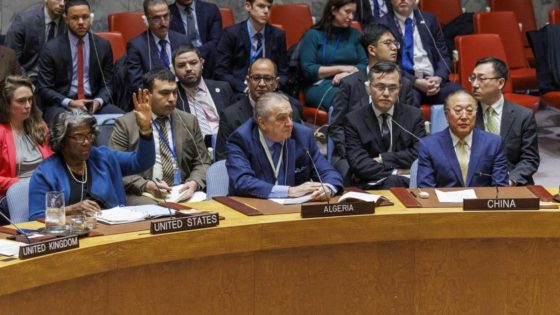The United Nations Security Council has failed to pass a resolution calling for an immediate ceasefire in Gaza as part of a hostage deal after Russia and China vetoed the measure proposed by the United States.
The resolution, which Algeria also voted against while Guyana abstained, called for an immediate and sustained ceasefire lasting roughly six weeks that would protect civilians and allow for the delivery of humanitarian assistance.
It marked a further toughening of the US stance toward Israel.
Earlier in the five-month-long war, the US was averse to the word ceasefire and vetoed measures that included calls for an immediate ceasefire.
“The vast majority of this council voted in favour of this resolution but unfortunately Russia and China decided to exercise its veto,” US ambassador to the United Nations Linda Thomas-Greenfield told the Security Council.
Before the vote, she said it would be a “historic mistake” for the council not to adopt the resolution.
Russia’s ambassador to the UN, Vassily Nebenzia, also speaking before the vote, called on members not to vote in favour of the resolution.
He said the resolution was “exceedingly politicised” and contained an effective green light for Israel to mount a military operation in Rafah, a city on the southern tip of the Gaza Strip where more than half of its 2.3 million residents have been sheltering in makeshift tents to escape the Israeli assault farther north.
“This would free the hands of Israel and it would result in all of Gaza and its entire population having to face destruction, devastation or expulsion,” Nebenzia told the meeting.
He said a number of non-permanent members of the Security Council had drafted an alternative resolution, which he called a balanced document, and said there was no reason for members not to support it.
China’s ambassador to the UN said the country also supported the alternative resolution.
But Thomas-Greenfield said that measure fell short.
“In its current form, that text fails to support sensitive diplomacy in the region. Worse … it could actually give Hamas an excuse to walk away from the deal on the table,” she said.
US Secretary of State Antony Blinken said on Thursday he believed talks in Qatar, which are focused on a six-week truce and the release of 40 Israeli hostages and hundreds of jailed Palestinians, could still forge an agreement.
The US resolution had backed talks brokered by the US, Egypt and Qatar over a ceasefire.
A diplomat said a resolution drafted by the 10 elected members of the Security Council under Mozambique’s co-ordination could be brought forward for a vote as soon as Friday afternoon.
The draft resolution, obtained by Reuters, demands an immediate ceasefire for the Muslim holy month of Ramadan, the release of all hostages and emphasises the need to expand the flow of humanitarian assistance to Gaza.
China’s ambassador to the UN said the text proposed by the US was unbalanced and criticised it for not clearly stating its opposition to any military operation by Israel in Rafah, which he said could lead to severe consequences.
“The US draft … sets up preconditions for a ceasefire, which is no different from giving a green light to continued killings, which is unacceptable,” ambassador Zhang Jun said after the vote.
He said if the US was serious about a ceasefire, it would not have vetoed multiple previous Security Council resolutions.
During the war, the US has vetoed three draft resolutions, two of which would have demanded an immediate ceasefire.
The US had justified its veto by saying such council action could jeopardise ceasefire talks.
The US has wanted any Security Council support for a ceasefire to be linked to the release of hostages held by Hamas in Gaza.
Hamas attacked Israel on October 7, killing 1200 people and taking 253 hostages, according to Israeli tallies.
Israel’s offensive has killed almost 32,000 Palestinians, according to health authorities in Hamas-ruled Gaza.
with DPA
Source Agencies


